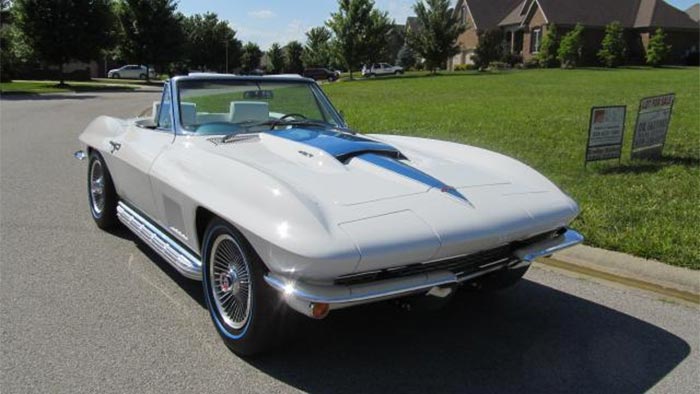We often post articles about Corvettes for sale on eBay, Craigslist, or other locations. In those posts we generally mention “matching numbers” and that prospective should do their due diligence before purchasing a car, especially when the prices for many Corvettes these days can run into the 6-figure range.
Recently, the folks over at Hagerty posted an article about what happens when a high end Corvette doesn’t turn out to be what the new owner thought it was. The article talks about an owner who recently purchased a stunning white on blue 1967 427/400, 4-speed Corvette convertible with air conditioning for north of $100,000. The car was advertised as “numbers matching” and after the engine’s VIN stamp was flagged at a NCRS meet the new owner sought the assistance of Corvette restoration guru Kevin Mackay of Corvette Repair, Inc. to verify what he had purchased.
After looking over the car, Mackey had some bad news for the owner. Turns out that rather than being a highly desirable 400hp, 4-speed, A/C convertible, the car had most likely been born as a Marlboro Maroon small block car worth much less than the owner had paid. Even after litigation and even more money spent, the buyer was unable to recoup his losses.
“I can’t tell you how many cars customers have brought to me that have fraudulent VIN tags and trim tags and restamped engine blocks,” Mackay said.
Prior to buying a car Mackay suggests you check out the VIN tag to see if it’s attached properly. He also recommends looking at the frame and peeking behind body panels for suspicious repairs. He goes on to note that prospective buyers should inquire about the current title, ownership and maintenance documentation as well as any restoration photos that the previous owner may have. All of the those items can help show what’s been done to a car over its lifetime and help verify what you’re looking at before the car rolls up on the auction block.
“Maybe 70 percent of the time, I can identify a fraudulent car without seeing it in person,” he said.
So the moral of this story is to be sure you know what you’re buying. If you’re not sure find someone like a Kevin Mackay that is knowledgeable in the year of car you’re considering. The NCRS or your local Corvette club(s) are a great place to start. We’re part of a close knit hobby and there’s no shortage of people who are willing to lend a hand.
It’s definitely worth the effort to pay someone a few hundred dollars to look at car before you spend thousands on one.
As a prospective Corvette buyer this blogger echoes Mackay’s sage advice. When you’re looking at a car, start with the trim and VIN tags then move on to the engine and transmission stamps. If the mechanicals check out move on to the body feeling for damage on the fender lips. If possible have the seller put the car up on a lift or jack stands to look for frame and further body repairs. If you notice something changed from stock ask the seller if they have documentation of the work that was done. Ask them where they bought it from and if they know any other previous owners.
If after following the advice above you’re still not comfortable with a purchase, don’t be shy about walking away and keeping your money in your pocket.
Source:
Hagerty
Related:
[STOLEN] 1964 Corvette Recovered and a California Man is Arrested in Craigslist Scam
New York Corvette Buyer Scammed by Fake Dealership
Court Rules Vintage Corvette Belongs to Last Buyer
-



![[VIDEO] Dennis Collins Checks the Numbers on a 1970 Corvette LT-1 Before Taking It Home [VIDEO] Dennis Collins Checks the Numbers on a 1970 Corvette LT1 Before Taking It Home](https://www.corvetteblogger.com/images/content/uploads/2024/04/041724_1-218x150.jpg)

Kevin McKay is a true expert on Corvettes with a specialty in Competition Corvettes. I have known him over 25 years and can attest to his knowledge and integrity.
Looking for 62 Corvette C1 at a reasonable price, all original car. Scam free!
Comments are closed.